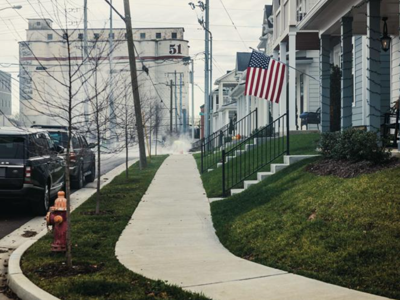This story is a partnership between the Nashville Banner and the Nashville Scene. For more information, visit NashvilleBanner.com.
Two of the more substantial pieces of a planned zoning reform push are being put off until next year as the lead Metro Council sponsor considers input from city departments and the community.
First-term At-Large Metro Councilmember Quin Evans Segall said Wednesday she is withdrawing bills 2024-185 and 2024-186 until completion of a Metro study of the infrastructure needs of different housing types, estimated to be delivered in March of next year. The bills would legalize three- and four-unit residential complexes in much of the urban services district and duplexes in much of the general services district. Other pieces of legislation included in the push, dubbed Nashville’s Essential Structures for Togetherness (NEST), will continue to be considered, with District 20 Metro Councilmember Rollin Horton set to serve as lead sponsor for some of the bills.
Evans Segall announced the withdrawal as the Metro Council was set to consider a resolution filed by District 3 Metro Councilmember Jennifer Gamble and supported initially by several of the most vocal NEST skeptics on the council. That nonbinding resolution requests Metro departments complete the ongoing infrastructure study by Aug. 1, 2025.
“I think it makes sense to withdraw those until we get closer to [the study’s delivery], because I think people deserve to have an open and honest conversation about timing,” Evans Segall tells the Nashville Banner. “And as long as that report is a little up in the air, we can't have that clarity. … We just thought the study would be back sooner than it was.”
Gamble tells the Banner her resolution was not a response to the NEST bills, but she offers criticisms of the community engagement process undertaken by Evans Segall and others to date. Gamble says, “People were insisting on doing this process backwards” by seeking community input after bills were filed.
“Council is the last step," Gamble says. "By the time I bring a zoning bill to council, I have had so many community meetings, so many adjustments or revisions to the plan based on that input, so that once it gets to the council, I'm expecting it to be supported and approved because it's got community support, it's got Planning Commission and planning staff reviewing analysis. In this case, the sponsor of those zoning proposals didn't do that. They didn't go through the normal process or, in my opinion, the most effective process for presenting a zoning deal. They presented legislation first without having any plan or any data or any community engagement.”
On Wednesday, Gamble pushed consideration of the infrastructure analysis resolution until the next Metro Council meeting in order for the public to weigh in and give Metro departments a chance “to look at if they can get us the info sooner than the Aug. 1 deadline.”
Councilmembers file bills aimed at encouraging more types of housing
Evans Segall has held a series of community meetings around the county about the proposal, and she says the plan was always for these two bills to take several months of work with council and community input. She also notes that Gamble should know “all too well” that bills can be amended throughout the legislative process, as the latter is advocating for an amendment to a subdivision bill being considered on third reading this week. At-Large Metro Councilmember Burkley Allen called the amendment “just a clarification of the language” at a Wednesday committee meeting.
One meeting, held over the weekend at Belmont University, turned particularly testy, with an at-capacity crowd jeering, booing and laughing throughout Evans Segall’s presentation. District 18 Metro Councilmember Tom Cash, who does not support (or formally oppose) the bills but helped host the meeting, had to tell the crowd to “take a deep breath.”
“I think there was unfortunately a lot of misinformation in [councilmembers’] newsletters and on Nextdoor about what [the bills] did,” Evans Segall said about the Belmont meeting. “When you show up with a preconceived notion of what something is, it is hard to listen and have an open and honest dialogue.”
Evans Segall offers support for Gamble’s resolution in her Wednesday statement. She also points to results from the Imagine Nashville survey that found Nashvillians overwhelmingly concerned about local housing costs and supporting a variety of housing.
“This is not a conversation that's going away anytime soon,” Evans Segall tells the Banner.
Adds Gamble: “We need more housing; I think that's that's one thing we all can agree on. … When we're looking at that, we need to consider where we can put those types of housing choices in the community that can accommodate and absorb it.”






